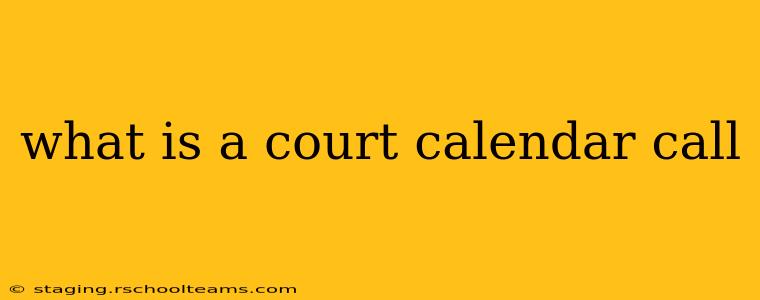A court calendar call, sometimes called a "calendar call" or simply a "call," is a procedural step in many court systems where attorneys and/or parties involved in a case appear before a judge or court clerk to discuss the status of their case. It's not a full hearing on the merits of the case; rather, it's a brief administrative proceeding designed to manage the court's docket and ensure cases progress efficiently. Think of it as a check-in to keep things moving.
What Happens During a Court Calendar Call?
The specifics of a calendar call vary by jurisdiction and court, but generally, it involves the following:
-
Attorneys' Presence (or Representation): Attorneys representing the parties usually attend the calendar call. In some cases, parties may appear in person, especially in simpler matters. Larger firms often have a dedicated attorney or paralegal who handles these calls.
-
Brief Case Overview: The attorney briefly summarizes the current status of the case to the judge or court clerk. This might include pending motions, discovery issues, upcoming deadlines, or settlement negotiations.
-
Setting Deadlines and Schedules: The judge or clerk will set or confirm deadlines for future filings, such as motions, responses, or discovery completion. They might also schedule further hearings or trials.
-
Addressing Procedural Issues: Any procedural issues or conflicts are addressed during the call. This might include resolving disputes over discovery requests or extending deadlines.
-
Case Management: The calendar call assists in case management by identifying any potential roadblocks to a timely resolution. It allows the court to efficiently allocate its resources and prioritize cases.
-
Settlement Discussions (Sometimes): While not always the focus, the judge might encourage or facilitate brief settlement discussions during the call.
Why are Court Calendar Calls Important?
Court calendar calls are vital for several reasons:
-
Efficient Case Management: They streamline the court process and prevent cases from becoming bogged down.
-
Early Identification of Problems: They allow for the early detection and resolution of procedural issues, avoiding delays later in the case.
-
Improved Communication: They promote communication between attorneys and the court, facilitating better cooperation and understanding.
-
Faster Case Resolution: By keeping cases moving forward, calendar calls contribute to a faster and more efficient resolution of disputes.
-
Reduced Court Congestion: Efficient management through calendar calls reduces overall court congestion.
What Happens if You Miss a Court Calendar Call?
Missing a court calendar call can have serious consequences, including:
- Sanctions from the Court: The judge may impose sanctions, such as fines or other penalties.
- Dismissal of the Case: In some cases, failure to appear might lead to the dismissal of the case.
- Negative Impact on Your Case: Missing the call could harm your case's progress and create a negative impression on the judge.
How to Prepare for a Court Calendar Call
Preparation is crucial for a successful court calendar call. This includes:
- Reviewing the Case File: Thoroughly review all relevant documents before the call.
- Understanding the Court's Rules: Familiarize yourself with the specific rules and procedures of the court.
- Preparing a Concise Summary: Prepare a brief summary of the case status for the judge.
- Anticipating Questions: Think about potential questions the judge might ask and have answers ready.
What is the difference between a Court Calendar Call and a Hearing?
A hearing is a formal proceeding where evidence is presented and arguments are made. A calendar call, on the other hand, is a brief administrative procedure designed primarily to manage the court's docket and address procedural matters. Hearings involve much more detailed presentations and potentially witnesses; calendar calls are usually short and focused on procedural aspects.
What if my case doesn't have a Court Calendar Call?
Not all cases require a court calendar call. The judge or court may determine the necessity of a calendar call based on the complexity and type of the case. Simpler cases might proceed directly to other stages of litigation without a formal calendar call. You should consult with your attorney for clarification if your case hasn't scheduled one.
This comprehensive overview should clarify what a court calendar call is and its importance in the legal process. Remember, this information is for general educational purposes and does not constitute legal advice. Always seek guidance from a legal professional for specific advice related to your case.
